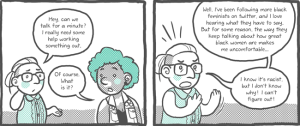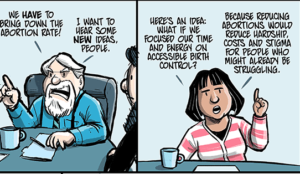Race, the final frontier. No matter what channel you watch, no matter what feed you aggregate and it seems like everybody, everywhere is talking about race right now. And when everybody everywhere is talking about race, that means sooner or later you’re gonna have to tell somebody that they said something that sounded racist. So, you need to be ready and have a plan in place for how to approach the inevitable “that sounded racist” conversation and I’m going to tell you how to do that.
The most important thing that you’ve got to do is remember the difference between the “what they did” conversation and the “what they are” conversation. Those are two totally different conversations that you need to make sure that you pick the right one.
The “what they did” conversation focuses strictly on the person’s words and actions and explaining why what they did and what they said was unacceptable. This is also known as the “that thing you said was racist” conversation and that’s the conversation that you want to have.
The “what they are” conversation on the other hand takes things one step further and uses what they did and what they said to draw conclusions about what kind of persons they are. This is also known as the “I think you are a racist” conversation. This is the conversation you don’t want to have, because that conversation takes us away from the facts of what they did and to speculation about their motives and intentions. And those are things you can only guess at, you can’t ever prove and that makes it way too easy for them to derail your whole argument. And that is the part that is crucial to understand.
When you say “I think he is a racist”, that’s not a bad move because you might be wrong, that’s a bad move because you might be right. Because of that dude really is racist, you wanna make sure you hold them accountable and don’t let him off easy. And even though intuitively, it feels like the hardest way to hit him is just run up on him and say “I think you’re ass is racist,” when you handle it that way, you’re actually letting him off easy, because you are setting up a conversation that is way too simple for him to derail and duck out of.
Just think about how this plays out every time a politician or a celebrity gets caught out there. It always starts out as “what they did” conversation. But as soon as the celebrity and their defenders get on camera, they start doing judo flips and switching into the “what they are” conversation. “I have known this person for years, and I know for a fact that they are not a racist and how dare you claim to know what’s inside their soul just because they made one little joke about watermelon tap dancing and going back to Africa.”
And then you try to explain that “We don’t need to see inside their souls and know that they shouldn’t say all that about the watermelon”, and you try to focus on the fact of this situation, but by then it’s too late because of the “what they are” conversation as a rhetorical Bermuda Triangle where everything drowns in the sea of empty posturing until somebody just blames it all on hip hop and we forget the whole thing ever happened. Don’t let this happen to you.
When somebody picks my pocket, I’m not gonna be chasing him down so I can figure out whether he feels like he’s a thief deep down in his heart. I’m gonna be chasing him down so I can get my wallet back. I don’t care what he is but I need to hold him accountable for what he did.
And that’s how we need to approach these conversations about race. Treat them like they took your wallet and focus on the part that matters, holding each person accountable for the impact of their words and actions. I don’t care what you are; I care about what you did.
Want to discuss this further? Login to our online forum and start a post! If you’re not already registered as a forum user, please register first here.
Jay Smooth hosts New York’s longest running hip-hop radio show, WBAI’s Underground Railroad, and founded one of the first hip-hop websites, hiphopmusic.com. In 2007 he started the first Hip-Hop videoblog at illdoctrine.com, which has since blossomed into an important, award-winning website. He been featured on NPR’s All Things Considered, was named a “Breakout Star” by New TeeVee, and his podcast was cited as one of the “Best of 2008” by iTunes. Follow him on Twitter @jsmooth995.
Tired of feeling like you’re not good enough – whether it’s because of your gender, size, race, sexual orientation, class, or ability?
Check out this online course, Everyday Self-Love, to help you free yourself from society’s toxic messages and reclaim the self-love that you deserve. Sandra Kim, founder of Everyday Feminism & leadership coach, will provide a step-by-step process in order to be more accepting and loving toward yourself.
Search our 3000+ articles!
Read our articles about:
Our online racial justice training
Used by hundreds of universities, non-profits, and businesses.
Click to learn more
Most Read Articles
- « Previous
- 1
- …
- 30
- 31
- 32




















